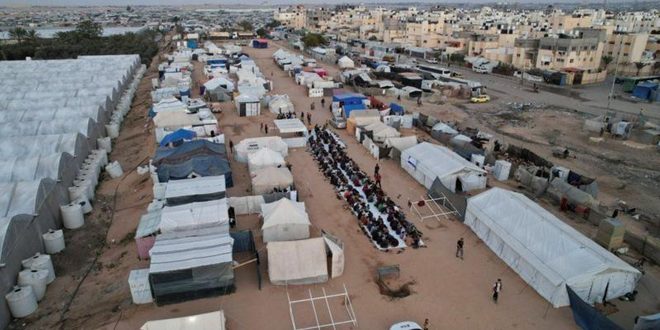Occupied Al_Quds, (ST) – Sami Abu Al-Hussein is a citizen form East Rafah describes the scene in the eastern towns of the city located south of Gaza Strip, the people of which the occupation is trying to displace through a scorched earth policy.
He said: I will not leave my house despite the ongoing Israeli occupation bombardment day and night. Shell fire is burning our surroundings and explosions continue to sound, but all of that will not force us to flee from the east of the city of Rafah.
Sami Al-Dabbari, in turn, told SANA reporter: “We live in the town of Al-Nasr, east of Rafah. Our days pass under the impact of the Israeli bombing, from which neither our homes nor our farms were spared. We presented dozens of martyrs and hundreds of wounded. The occupation is trying to push us to move to the west of Salah Al-Din Street in preparation for the invasion of the city from the eastern side, especially since the town Al-Nasr is located close to the territories occupied in 1948”.
Close to the town of Al-Nasr is the village of Al-Shouka, whose people continue to steadfast in their homes despite air strikes and shelling with various types of weapons, in addition to the scarcity of food and water after the wells stopped since the start of the aggression as a result of the occupation cutting off electricity and fuel supplies to the Strip.
Elderly woman Mona Al-Dabbari says: 22 members of my family were martyred here in the village after our homes and fields were bombed, but I and most of the villagers who work in agriculture and livestock raising refuse to leave despite the flames of shells and missiles.
Muhammad Al-Shaer, one of the villagers said that the villages of Al-Shawka, Al-Nasr, and Al-Fukhari, located close to the territories occupied in 1948, constitute most of the eastern area of the city of Rafah, and the residents of those towns are anticipating at every moment the entry of the occupation tanks and bulldozers whose sound does not stop, but that does not frighten them.
Palestinian human rights organizations have strongly condemned the occupation’s continued policy of bombing homes on the heads of their residents in Rafah as part of an intimidation operation aimed at forcibly displacing residents and displaced people from the city in preparation for a massive ground invasion.
The human rights organizations stressed that the occupation’s continued commitment of horrific crimes in Gaza is a result of the policy of impunity enjoyed by the occupation in light of the immunity provided by the United States and European countries, warning of the dangers of the Rafah invasion on the people of the Gaza Strip who gather in the city and the occupation prevents them from returning to the city and their homes, especially those forcibly displaced from Gaza City and the northern Gaza Strip.
The institutions called on the international community to take serious and immediate action to force the occupation to abide by the binding decisions of the International Court of Justice to prevent the commission of genocide targeting 2.4 million Palestinians in Gaza Strip through a policy of mass killing and infliction of severe physical and psychological harm, the comprehensive destruction of homes, infrastructure and necessities of life, and collective punishment represented by starvation and thirst. Depriving them of treatment and forcing them to move away from their places of residence in conditions that lack the most basic human rights, and then targeting and killing them in the place of their displacement.
Raghda Sawas

